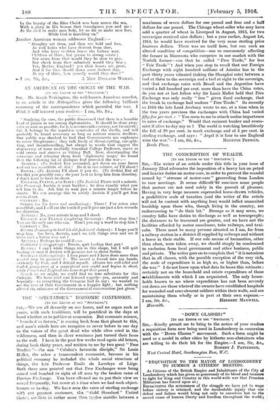THE SPECTATOR'S " ECONOMIC CONFESSION. tie THE EDITOR Or run
SrECTAT03.1 are all devoutly on our knees, and no organ such as yours, with such traditions, will be pontifical in the days at hand whether as to politics or economics. But economic science, "banished to Saturn," is coming back from that planet to this, and men's minds here are receptive as never before in our day to the voices of the great dead who while alive cried in the wilderness, and then in cheer weariness just turned their faces to the wall. I have in the past few weeks read again old letters, dating back thirty years, and written to me by two great " Free Traders "—the one " Cobden's favourite disciple," Sir Louis Mallet, the other a transcendent economist, because in his political economy ho included the whole social structure of things, the late Professor Emile de Laveleye of Liege. Both those men pointed out that Free Exchanges were being ruined and bombed in sight of all men by the broken rates of Foreign Exchange.. You have allowed me to put their view on reeerd frequently, but never at a time when we had such object- lessons HE to-day. We have seen the rates of sterling exchange with car .greatest customer, thet -"Gold...Standard " United Skate;, ose:Uate in rather more :'.ion txelve months between a maximum -of seven dollars for one pound and four and a half dollars for one pound. The Chicago wheat-seller who may have sold a quarter of wheat in Liverpool in August, 1915, for two sovereigns received nine dollars ; but a year earlier, August 1st, 1914, he would have received for the very same sterling price fourteen dollars. There was no tariff here, but can such an altered condition of competition—one so enormously affecting the farmer in Minnesota who competes in our market with the Norfolk farmer—can that be ..called " Free Trade," far less Fair Trade" ? And when you stop to recall that our Foreign Exchange with eight hundred millions of Asiatics has in - the past thirty years vibrated (taking the Shanghai rate) between a tail at three to the sovereign and a tail at eight to the sovereign, and that exchange rates with Brazil and the Argentine have varied a full hundred per cent. more than have the China rates, do you not at last follow why Sir Louis Mallet held that Free Exchange was only really " free " given fixed exchange, that the break in exchange had undone " Free Trade." So recently as 1910 the late Lord Avebury wrote to me, at a time when in the two years previous the exchanges with China had varied fifty-five per cent. : "You seem to me to attach undue importance to rates of exchange." Would that eminent banker and econo- mist if alive to-day say so ? The world is watching breathlessly the fall of -20 per cent. in made exchange and of 5 per cent. in sterling exchange, and says : " Argal it is four to one England wins the war."—I am, Sir, &c., MORETON FREWEN. Brede Place.


































 Previous page
Previous page